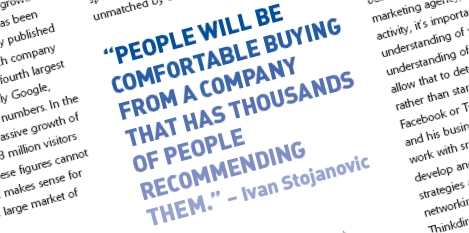Creating your personal and or company brand is a delicate act on the social networking sites. You really need to be genuine, positive, honest, and stand behind anything you say. And that is something in the contradiction with the main task – being Active. What do you say on a web 2.0 sites – if you have nothing to say that day? You know you need to be active and communicate with others. The long term success of that contribution you make to the social networking – depends on the Quality of your contribution. If you have nothing to say – say nothing.
Quality of your online content
It took me a lot of time to learn that. After some time (and numerous mistakes!) I have realised that it is sometimes worth far more to post once a week on a blog than once a day! The quality of the content is actually far more worth than the quantity. If it takes a week to write a good article, do not rush it. Do not force yourself to publish when you do not have something of a value for your audience.
Digital Footprint
All you say (write) on the Web 2.0 sites will stay there, and will work for or against you in the future. It will always be easy to put your name or your company name in Google and check what you are all about. Your name associated with something you are not proud while publishing it – will most likely hurt you at some stage in the future. Carefully choose what photos you publish, and how you represent yourself on the web. Your digital footprint is there to stay!
Release your Marketing Message
The social networking sites like LinkedIN, Twitter and Facebook and blogs let you publish your ideas, thoughts and opinions. Define who you are and what you are. Then define who your target market and the audience are. List the topics you know about and they want to hear about. Bring your original marketing message in the mix. Do not push it on your audience. Leave it there for them to take it.
Let Go of your Marketing Message
This is what worries most of us. Corporations are shivering with just the idea of it! What do you mean by letting go of our (so far always tightly controlled) marketing message?
In the Social Web, the users will take your messages and give their spin on it. Here you are getting crowd generated picture of your brand. Your only made the initial input and slightly steering and maintaining it later on. Your audience – the crowd will decide if they like your message, and will contribute to it.
Candidate Digital Personal Branding
Your CV is great tool to open the doors. But it gives you what you want to say about yourself. This is why recruiters ask for references. To check up and make sure all you wrote is true, and that there isn’t something important missing.
In the Digital world of the Blogs and Social Networks – it is all about the public opinions being formed around yourself. It is about the number of people you are connected, about the ‘qualities’ of this connections. It is about the quality of your contribution to the public communication. It is about the response from the crowd on your social communication contribution. Does the crowd like you? Do they value your professional opinions?
How do you measure your Digital Branding success?
When the people you do not know, not your co workers, not friends or family, simple people who find you online – publicly show respect to your work and you – you must be doing a lot of good! It doesn’t happen overnight! You will need to invest a lot in creating a digital brand. Regardless if that is yourself or your company brand. It takes time.
The Social Web is changing. Remember MySpace? Remember Bebo? Both are gone. Have you started with Google Wave, or did you decided that you will be left behind? Social media tools are changing. You need to change your skills to be able to follow the change. Your message although always the same in its essence will have to be adapted for every new web publishing and collaboration tool that comes around.
Conclusion and a Real Life Personal Branding Example
Related to the recent article about the Internet traffic on Job Sites, I asked the LinkedIN Users for their input via the LinkedIN discussion: Irish jobs sites traffic comparison chart. Here is just a short few sentences I got as a reply:
Thanks Ivan and admire your humble approach. I suspect this combined with your vast knowledge and being a genuine nice person is how you have gained my respect and trust of so many others also. You have not become one of the market leaders for no reason…
…Hope to catch up with you again at the Christmas drinks.
Would like to hear how other niche and generalist job boards are doing, if you’d like to share….
MD of one of the Irish Jobs Site
When you start getting positive comments like this from the ‘crowd’ – people you are not associated to in any way, they start forming a Digital Image of your brand. Competitors recognition as in this case is of the utmost importance – that was the reason I have chosen this comment in front of all the others. It is a bit like the eBay and the recommendations it introduced smartly in ecommerce. People trust brands that are positively spoken about online.
What will you do today to create a Digital Image of yourself that you desire?
 Will you advertise on Facebook or in the traditional proven media like newspapers or radio?
Will you advertise on Facebook or in the traditional proven media like newspapers or radio?